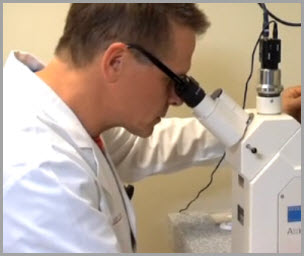5 Reasons to See Your Urologist

A urologist is a physician that specializes on the diseases and conditions of the male and female urinary tract, and male reproductive organs. Certain medical situations warrant for you to make an appointment to see an urologist.
-
Male infertility
Conception depends on the health of both partners, with male fertility problems accounting for nearly half of all cases of infertility. However, male fertility is often overlooked, as traditionally the female partner goes to the OBGYN and then to a fertility specialist. There are many causes of male infertility including low sperm count, poor sperm function, illness, injury, and environmental or lifestyle factors, such as obesity, stress, and alcohol use. Many of these causes are treatable. A urologist can determine the best treatment for you based on the underlying cause. -
Blood in your urine
The presence of blood in the urine, or hematuria, can be indicative of a serious problem or it can be a temporary, response to factors such as strenuous exercise or use of certain medications. It is important to see your urologist any time blood is detected in the urine to determine the underlying cause. Causes requiring treatment include infection (urinary tract or kidney), bladder or kidney stones, an enlarged prostate, kidney injury or disease, and cancer. -
Abnormal prostate exam
Males over the age of 50 are encouraged to get a prostate exam every four years. If an abnormality, such as a lump or enlargement of the prostate, is detected, your urologist will perform follow-up tests to determine a diagnosis. These might include an ultrasound, urinalysis, blood test, cytoscopy, or biopsy. Benign prostatic hypertrophy (BPH) is an enlargement of the prostate that occurs with age and can lead to urinary symptoms. Other causes of an abnormal exam can include prostatitis (inflammation of the prostate) and cancer. -
Testicular mass
Symptoms of a testicular mass can include a lump in the scrotum, pain, or a testicle that is tender, swollen, or hardened. You might also experience nausea and/or vomiting, and in the case of infection; fever, urinary frequency, blood, and/or pus in the urine can occur. Most masses are benign, such as hydroceles (fluid-containing cysts) or varicoceles(enlarged veins), but in some cases the mass can result from an inguinal hernia, infection, or a cancer. If you experience sudden pain, seek emergency care to ensure the prevention of irreversible testicular damage. -
Vasectomy
A vasectomy is a short, minimally invasive surgical procedure in which the tubes that carry sperm are cut and sealed to prevent sperm from entering the ejaculate. Although reversal is possible, the vasectomy is considered a permanent form of birth control that is nearly 100% effective at preventing pregnancy. Your urologist can perform the procedure, which typically takes less than 30 minutes under local anesthesia and has a low risk of complications. It is important to note that a vasectomy does not protect against sexually transmitted infections. While any board certified urologist is legally qualified to perform a vasectomy, there are additional certifications that you should look for to ensure the best results.






